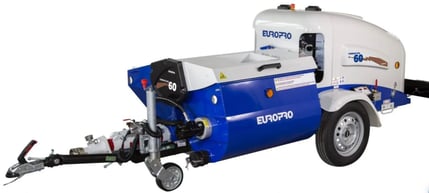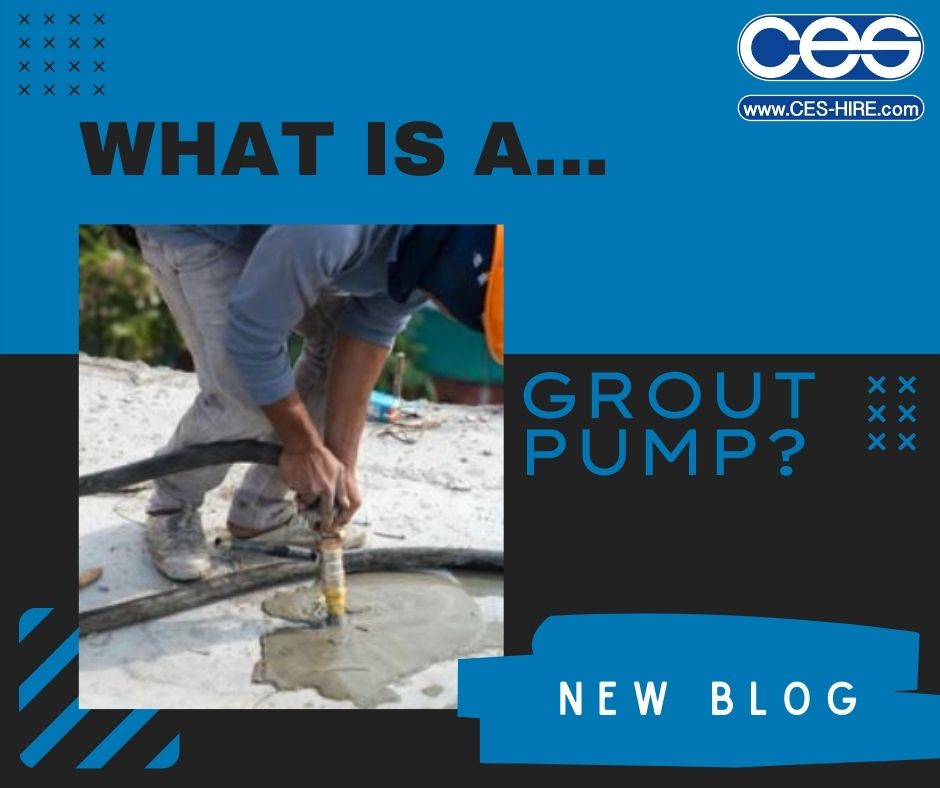What is a Grout Pump?
Essentially a grout pump fills a void (small or large) with a pumpable material which will then provide strength, durability and waterproofing qualities to the finished product. Grout is typically a mixture of cement, sand and water mixed with other materials such as fine gravel which together will form a tough substance especially once dried and set.
A grout pump is a particularly versatile machine that is suitable for many applications. However, it is important to have a clear understanding of your specific machine requirements since not all machines are designed for all applications. This is where a specialist company like CES are here to help; give us a call and pick our brains to ensure you select the right pump for your material and project. It is a crucial to follow the system of selecting a material that matches the job, followed by matching a machine to your material.
Grout Applications
Grout pumps are frequently used in the infrastructural industry to ensure key constructions have structural integrity and are built to last. Waterproofing is another popular use for these pumps since building below ground will always have an element of risk with groundwater attempting to seep in and underground structures being prone to cracks. Grouting will seal cracks and openings and provide waterproof qualities to a structure. Other grouting applications include
- Manhole, tunnel and sewer lining; preventing water hazards in underground structures
- Levelling pavement slabs
- Laying new tiles and floor finishes
- Floor restoration and raising up sunken floors
- Filling voids and removing holes in concrete blocks
- Linking prefabricated concrete sections
- Joint Sealing
- Sure-up hollow door and window frames
- Stabilising walls
- Rehabilitation of historical structures
- Build retaining structures to prevent soil erosion
- Creating horizontal structures or barriers
- Structural repairs and underpinning structures to prevent settlement
Types of Grout Pump?
 Grout can a tricky substance to work with so it is essential to choose the correct equipment. At CES you will find a variety of pumps including manual hand operated pumps, electric pumps and diesel pumps. Hand operated manual pumps such as the Airplaco HG-9 Hand-operated Grout Pump are convenient since they are lightweight and compact so will fit into the smallest of spaces. They do not need a power source and are controlled by the operator which makes them ideal for smaller more intricate jobs such as levelling a concrete slab, filling a crack or grouting door frames. The user has full control over the output so they can grout with accuracy. Larger electric or diesel machines are useful for bigger projects since they have a higher output controlled by the machine. They will pump more material both vertically and horizontally in less time. CES have a range of electric machines such as the InoBeam M8, Euromair DropPro 8P and the Euromair Compact Pro 30. Our Diesel range includes Putzmeister models like the SP11 LMR and TMR and the Euromair Compact Pro 80. Within these pump categories you will find piston, helical rotor (worm drive pumps) and peristaltic pumps. Piston pumps will generally work with higher pressure and lower output and a worm pump the reverse, a lower pressure but a much higher output/flow rate.
Grout can a tricky substance to work with so it is essential to choose the correct equipment. At CES you will find a variety of pumps including manual hand operated pumps, electric pumps and diesel pumps. Hand operated manual pumps such as the Airplaco HG-9 Hand-operated Grout Pump are convenient since they are lightweight and compact so will fit into the smallest of spaces. They do not need a power source and are controlled by the operator which makes them ideal for smaller more intricate jobs such as levelling a concrete slab, filling a crack or grouting door frames. The user has full control over the output so they can grout with accuracy. Larger electric or diesel machines are useful for bigger projects since they have a higher output controlled by the machine. They will pump more material both vertically and horizontally in less time. CES have a range of electric machines such as the InoBeam M8, Euromair DropPro 8P and the Euromair Compact Pro 30. Our Diesel range includes Putzmeister models like the SP11 LMR and TMR and the Euromair Compact Pro 80. Within these pump categories you will find piston, helical rotor (worm drive pumps) and peristaltic pumps. Piston pumps will generally work with higher pressure and lower output and a worm pump the reverse, a lower pressure but a much higher output/flow rate.
Matching Machine & Material
 If you require further information regarding matching your material to the right machine, don’t hesitate to call us on 01494 715472. We’d be happy to advise you and support you on your grouting journey. Also take a look at our blog ‘Choosing the Right Grout Pump for Your Project’ for more tips and advice on what you need to look for when selecting the right grout pump.
If you require further information regarding matching your material to the right machine, don’t hesitate to call us on 01494 715472. We’d be happy to advise you and support you on your grouting journey. Also take a look at our blog ‘Choosing the Right Grout Pump for Your Project’ for more tips and advice on what you need to look for when selecting the right grout pump.



